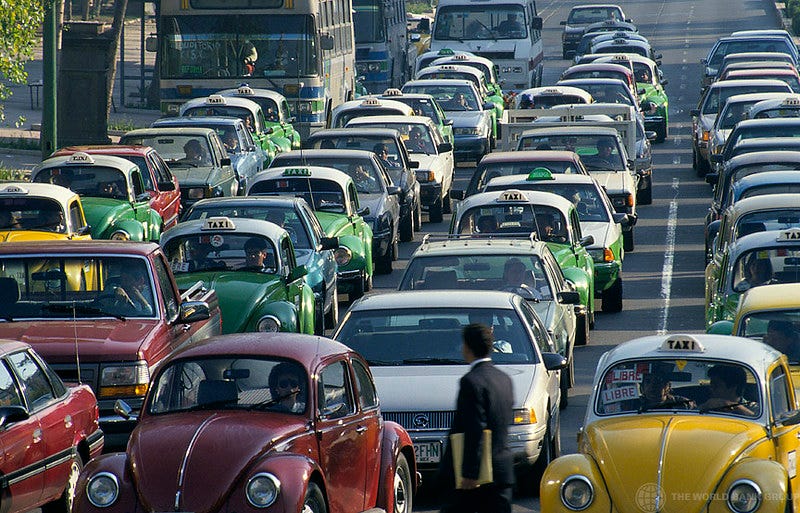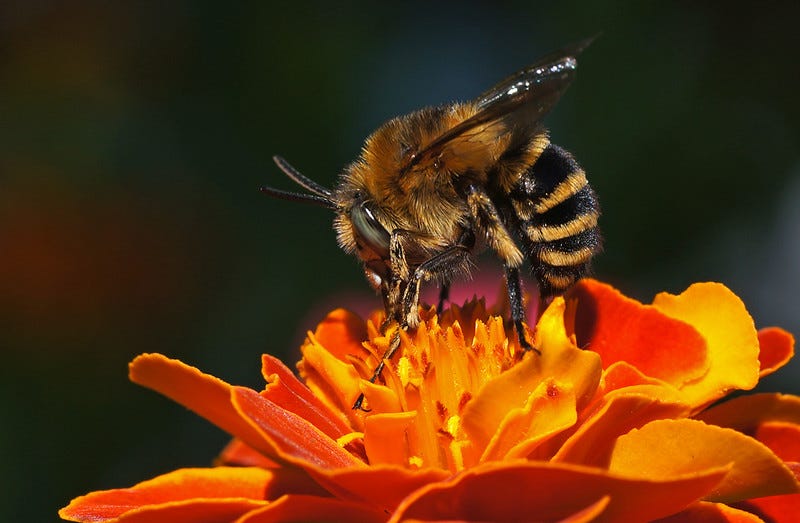14 December 2021. Transport | Insects, again.
Seven reasons why it is really hard to decarbonise transport. The story about disappearing insects is more complicated than it seems.
Welcome to Just Two Things, which I try to publish daily, five days a week. Some links may also appear on my blog from time to time. Links to the main articles are in cross-heads as well as the story.
#1: Seven reasons why it is really hard to decarbonise transport
I was a little lukewarm last week about the notion that behaviour change would revolutionise the transition to net zero transport (using “net zero” as a sharthand and parking all the caveats about it).
And I was reminded that I’d been sent a link to an article on The Conversation by Christian Brand about why transport would be hard to decarbonise. It’s a great summary.
(Congestion in Mexico City. World Bank Photo Collection, CC BY-NC-ND 2.0)
He has a list of seven reasons, in fact, so I’m going to do these quickly.
1. Demand is closely linked to population and economic growth
As economies and populations grow, demand for goods grows, as does the number of people with the desire and means to travel. Globally, total transport activity is expected to more than double by 2050 compared with 2015 under the trajectory reflecting current efforts.
This is the equation that has sat behind the “predict and provide” transport models that drove transport planning for the second half of the 20th century. There are some signs that it is starting to break down. But it also implies that forms of regulation are essential to break existing transport habits.
2. Transport is still 95% dependent on oil
Substituting oil with low carbon “fuels”, such as electricity, will drastically reduce emissions by 2050. But even an optimistic scenario where global new car sales were 60% electric by the end of the decade would see CO₂ emissions from cars drop by only 14% by 2030 compared with 2018.
3. We are too obsessed with electric cars
The COP26 presidency programme focuses entirely on road-transport electrification. Yet life-cycle emissions from electric vehicles depend heavily on the kind of electricity, battery and materials used... Electric cars do not solve problems of road traffic congestion, safety and other issues of car dependency. They also need a reliable electricity supply – not a given in many parts of the world.
4. ‘Jet zero’ is still a mirage
Middle- to long-distance air travel is hard to decarbonise because realistic “jet zero” technologies are limited for longer distances... However, we should be able to reduce the total number of flights by, for example, introducing frequent-flyer levies. A few frequent flyers cause most emissions: in 2018, 50% of aviation emissions were caused by 1% of the world’s population.
5. Cargo ships run on diesel and last for decades
Ships last for decades and run largely on the most polluting type of fossil diesel. Electrification is not a viable option.
As with aviation, ships operate in a global market so are difficult to govern and regulate. But the sector has significant potential to reduce emissions through a combination of retrofitting to use zero-carbon fuels, such as green ammonia, and “slow steaming”.
6. A collective sense of entitlement to the status quo
A collective sense of entitlement and dislike of limiting “personal choice” have a lot to do with inaction on reducing and improving travel by powered vehicles. Many people are reluctant to give up their car or flying, feeling that it is an infringement of their rights.
Possibly file under: The boomers are the most entitled and individualistic generation in the history of the planet.
7. We are locked into bad habits
Many developed countries are firmly locked into high-carbon infrastructures and lifestyles. Most modern cities have been built to serve cars, not people. The necessary roads, parking lots, driveways are set to last decades.
(See also 6, above). These two together reinforce a whole set of 20th century views of transport, fuelled by a whole group of voters who don’t realise that many people don’t have access to cars, or the health impacts of their vehicles, and who disbelieve almost any evidence that doesn’t fit their worldview. As we have seen in the UK on the Low Transport Neighbourhoods (LTNs) in parts of the country where local politicians are unwilling to articulate an inclusive view of the future of their communities.
(h/t Charlene Rohr)
#2. The story about disappearing insects is more complicated than it seems.
One of the benefits of a daily newsletter should be that you can pick up on things. I haven’t done that too often. But my son was disbelieving of the claim mentioned in yesterday’s Just Two Things, that the insect population was falling as drastically as claimed by German researchers. (They said that three-quarters of species had vanished in a set of wildlife reserves).
And it turns out—and I need to thank him for all of these links—that we actually don’t know very much at all about the state of the world’s insect populations.
The best critique of the actual research was by Manu Saunders, on her blog, starting from the point that “every ecological study has a context”.
She took the trouble to read the Methods section of the paper, and concluded that, among other things, the places that were described were a very specific type of area, and that if you’re going to make claims about decline on the scale they did, you need much better quality longitudinal data. That said, she didn’t dispute that insect populations are in trouble:
Despite the inevitable media beat-up, this study is an important scientific story. We know that overuse of agricultural chemicals, particularly pesticides , and intensification of agricultural landscapes have negative effects on non-target insects… I also hope the story gives much-needed attention to the fact that entomologists and insect ecologists all over the world need more support and funding to answer similar questions in other environments.
Of course, one of the problems is about the way in which large numbers get re-cycled by journalists and editors. I worked as a journalist for a decade, and it left me with a strong impression that most journalists were at sea with data. Perhaps more so, now that staffing levels have been scraped thin and they have less time to check anything. So the 75% number keeps on getting recycled: as in this Guardian article, by one of the scientists involved in the German study.
Quillette was sceptical about this claim, and did a lengthy critique—too long to summarise here. But they pointed out that the insect catastrophe narrative goes back to the mid-2000s, when we started seeing alarming stories about the collapse of bee colonies. Most news organisations have rowed back from that now, and most have even admitted that they were wrong.
By 2018, almost every major news organization—from the Washington Post (“Believe It or Not, the Bees Are Doing Just Fine”) to Slate (“The Bees Are Alright”) and including many environmental publications such as Grist (“Why the Bee Crisis Isn’t as Bad as You Think”)—was sheepishly acknowledging that there never was an imminent worldwide honeybee catastrophe. The New York Times was one of the few news outlets that conspicuously failed to reconsider its crisis narrative.
—
(Good news on bees. Photo by Nutmeg66/flickr, CC BY-NC-ND 2.0)
And in practice, honeybee populations have increased 30% since 2000, and wild bees are doing fine as well. The article also quotes a big metastudy that suggests that while 0verall insect numbers are declining, the rate of decline is nowhere near as fast as suggested in other studies:
A 2020 study from German researchers led by Dr. Roel van Klink represented the largest and most definitive study on global insect populations at the time of its publication. Their meta-analysis of 166 studies found that insects are declining much (three- to six-fold) less rapidly than previously reported, and freshwater insects are actually increasing. Other major findings included:
The only correlation with insect declines was habitat, specifically urbanization.
Cropland was correlated with insect abundance.
Insect declines in North America ended by the year 2000.
That said, for my money Quillette overplays its hand a bit by appearing to deny the idea of the ‘Sixth Great Extinction’, which is a pretty well established scientific view.
The most measured view is in American Scientist, which basically suggests that insect populations are complex and behave in complex ways, and this makes them hard to research in a reliable way. Even when we do have studies, publication bias is a problem:
Lack of data is a serious problem for insect conservation. Entomologists and ecologists have been voicing concerns about the holes in our knowledge of global insect diversity for many years. The lack of published data on insect population dynamics is likely the result of multiple biases within the publication system. Many academic journals are averse to publishing null results, such as no documented changes in an insect population.
The main concern in the American Scientist is about how little we know, about what seem like core ecological questions:
The more worrying story is how little we know about the ecology and distribution of the vast majority of insects. Why are some species declining and some increasing? Why do declines and increases happen periodically? Why do some species decline and then recover? How do alien or range-expanding insect species affect native populations? How do insects contribute to different ecosystem services? If we want to save insects, we need to investigate these questions.
But we do know some things, and these are mostly about the impact that humans have:
The studies behind the insect apocalypse story don’t show evidence of overall global insect declines. Instead, they provide examples of how humans can have cascading effects on biodiversity and ecosystem function. That humans are changing the Earth in damaging, often dangerous, ways is undeniable... Understanding the complexity of species and ecosystems is a first step to knowing how we can reverse this damage. The take-home message from these stories should not be one of apocalypse, but one of diversity, interactions, and an urgent need for inquiry.
j2t#227
If you are enjoying Just Two Things, please do send it on to a friend or colleague.




